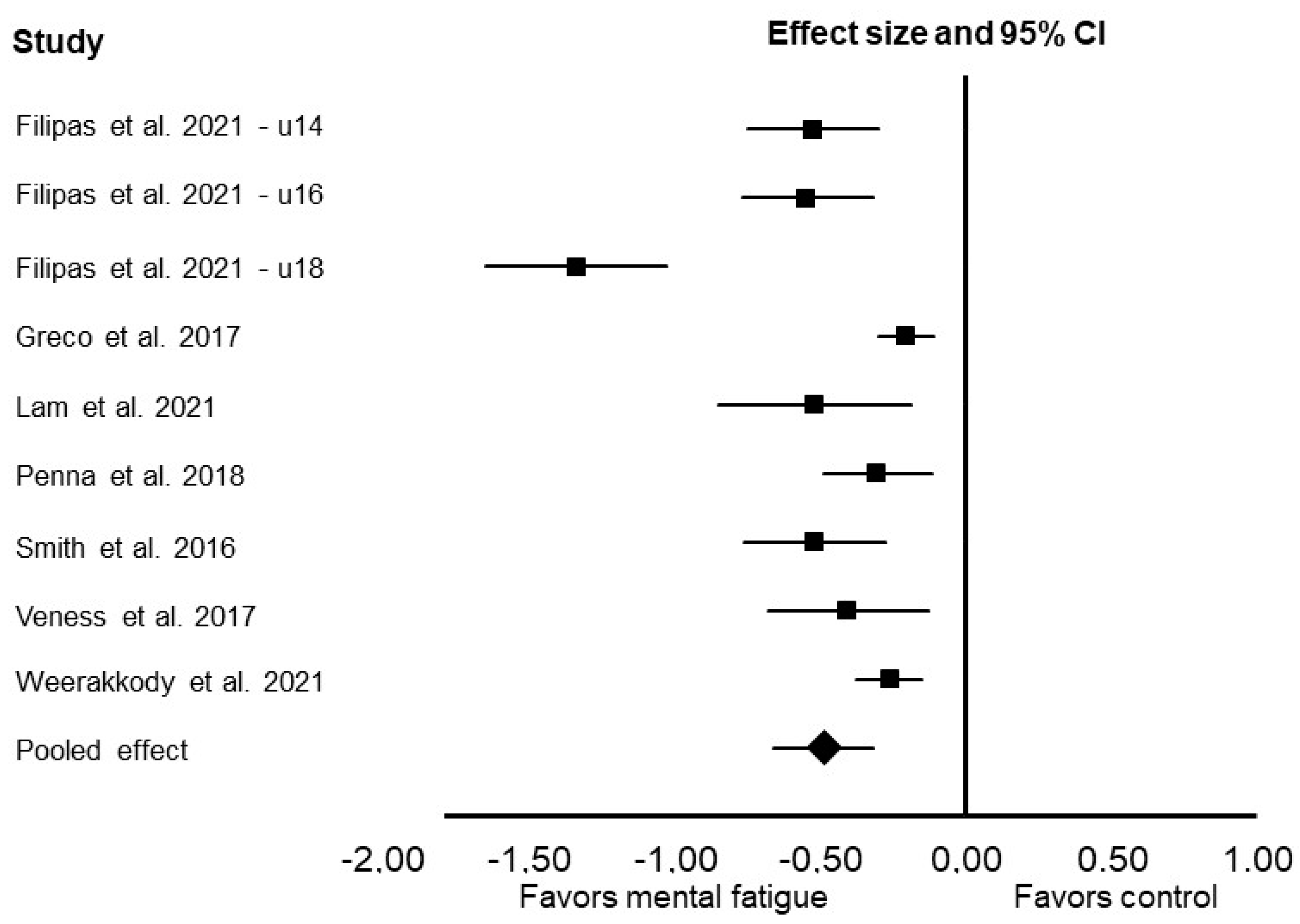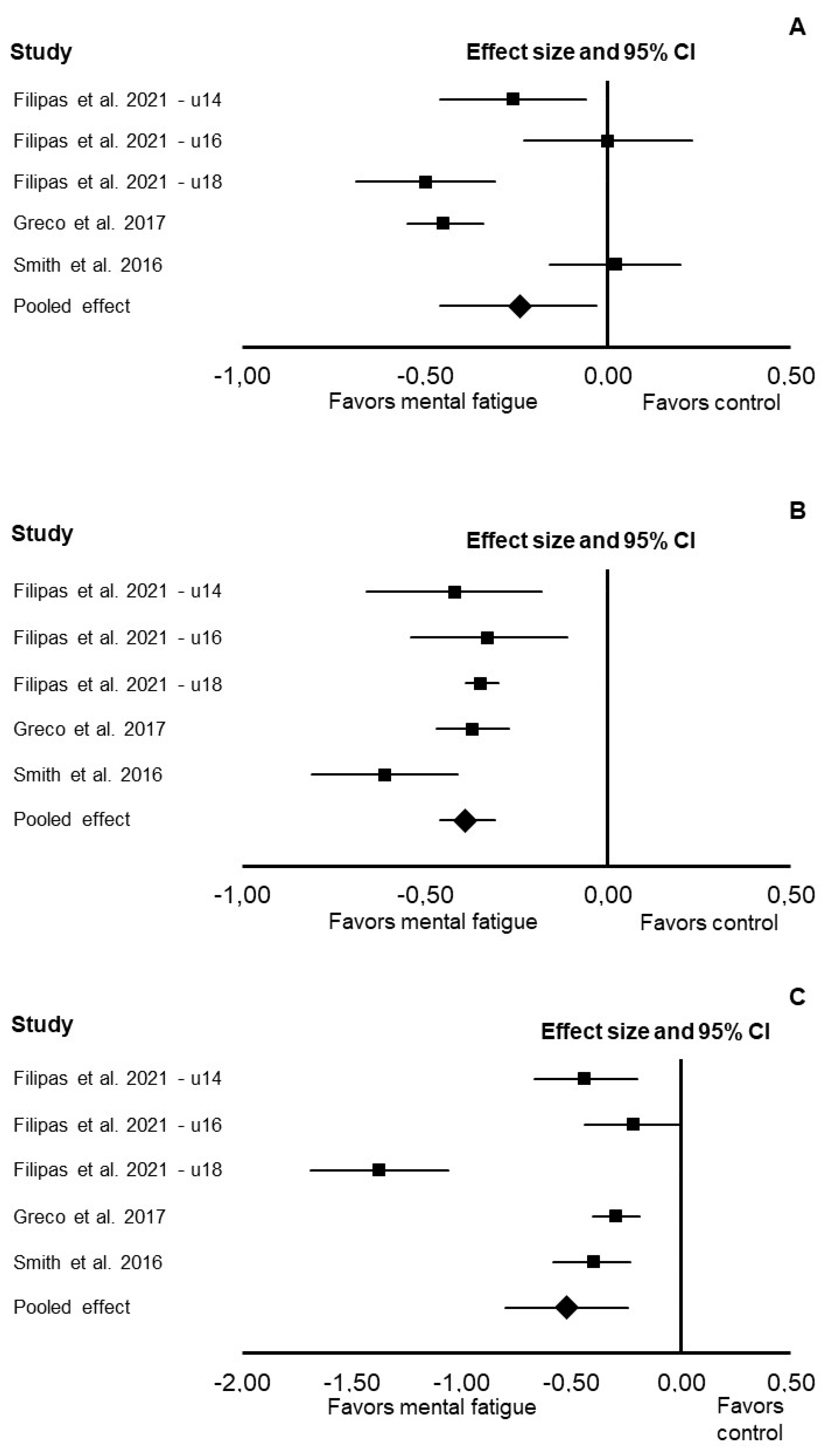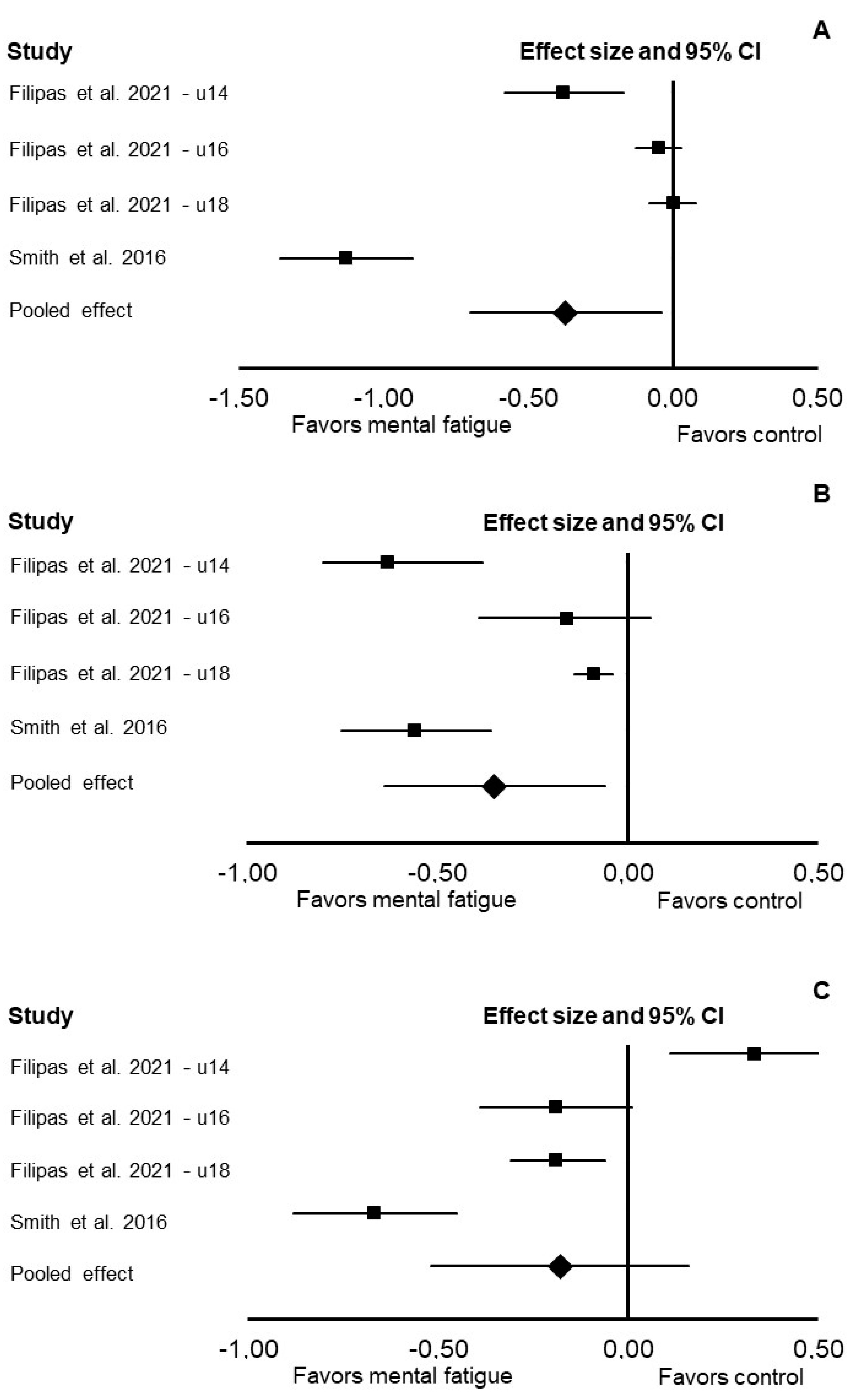Negative Effects of Mental Fatigue on Performance in the Yo-Yo Test, Loughborough Soccer Passing and Shooting Tests: A Meta-Analysis
Abstract
:1. Introduction
2. Materials and Methods
2.1. Literature Search Strategy
2.2. Selection Criteria
2.3. Data Extraction
2.4. Quality Assessment
2.5. Statistical Analysis
3. Results
3.1. Search Results
3.2. Summary of Studies
3.3. Methodological Quality
3.4. Meta-Analysis Results
4. Discussion
5. Conclusions
Author Contributions
Funding
Institutional Review Board Statement
Informed Consent Statement
Data Availability Statement
Conflicts of Interest
References
- Meeusen, R.; Van Cutsem, J.; Roelands, B. Endurance exercise-induced and mental fatigue and the brain. Exp. Physiol. 2020, 106, 2294–2298. [Google Scholar] [CrossRef] [PubMed]
- Marcora, S.M.; Staiano, W.; Manning, V. Mental fatigue impairs physical performance in humans. J. Appl. Physiol. 2009, 106, 857–864. [Google Scholar] [CrossRef]
- Habay, J.; Van Cutsem, J.; Verschueren, J.; De Bock, S.; Proost, M.; De Wachter, J.; Tassignon, B.; Meeusen, R.; Roelands, B. Mental Fatigue and Sport-Specific Psychomotor Performance: A Systematic Review. Sports Med. 2021, 51, 1527–1548. [Google Scholar] [CrossRef]
- Filipas, L.; Borghi, S.; La Torre, A.; Smith, M.R. Effects of mental fatigue on soccer-specific performance in young players. Sci. Med. Footb. 2021, 5, 150–157. [Google Scholar] [CrossRef]
- Greco, G.; Tambolini, R.; Ambruosi, P.; Fischetti, F. Negative effects of smartphone use on physical and technical performance of young footballers. J. Phys. Educ. Sport 2017, 17, 2495–2501. [Google Scholar]
- Lam, H.K.N.; Middleton, H.; Phillips, S.M. The effect of self-selected music on endurance running capacity and performance in a mentally fatigued state. J. Hum. Sport Exerc. 2021, 17. [Google Scholar] [CrossRef]
- Penna, E.M.; Filho, E.; Campos, B.T.; Pires, D.A.; Nakamura, F.Y.; Mendes, T.T.; Lopes, T.; Smith, M.; Prado, L.S. Mental fatigue does not affect heart rate recovery but impairs performance in handball players. Rev. Bras. Med. Esporte 2018, 24, 347–351. [Google Scholar] [CrossRef] [Green Version]
- Smith, M.; Coutts, A.J.; Merlini, M.; Deprez, D.; Lenoir, M.; Marcora, S. Mental Fatigue Impairs Soccer-Specific Physical and Technical Performance. Med. Sci. Sports Exerc. 2016, 48, 267–276. [Google Scholar] [CrossRef]
- Veness, D.; Patterson, S.D.; Jeffries, O.; Waldron, M. The effects of mental fatigue on cricket-relevant performance among elite players. J. Sports Sci. 2017, 35, 2461–2467. [Google Scholar] [CrossRef]
- Weerakkody, N.; Taylor, C.; Bulmer, C.; Hamilton, D.; Gloury, J.; O’brien, N.; Saunders, J.; Harvey, S.; Patterson, T. The effect of mental fatigue on the performance of Australian football specific skills amongst amateur athletes. J. Sci. Med. Sport 2021, 24, 592–596. [Google Scholar] [CrossRef]
- Bangsbo, J.; Iaia, F.M.; Krustrup, P. The Yo-Yo intermittent recovery test: A useful tool for evaluation of physical performance in intermittent sports. Sports Med. 2008, 38, 37–51. [Google Scholar] [CrossRef]
- Krustrup, P.; Mohr, M.; Amstrup, T.; Rysgaard, T.; Johansen, J.; Steensberg, A.; Pedersen, P.K.; Bangsbo, J. The Yo-Yo Intermittent Recovery Test: Physiological Response, Reliability, and Validity. Med. Sci. Sports Exerc. 2003, 35, 697–705. [Google Scholar] [CrossRef]
- Grgic, J.; Oppici, L.; Mikulic, P.; Bangsbo, J.; Krustrup, P.; Pedišić, Ž. Test–Retest Reliability of the Yo-Yo Test: A Systematic Review. Sports Med. 2019, 49, 1547–1557. [Google Scholar] [CrossRef] [PubMed]
- Ali, A.; Williams, C.; Hulse, M.; Strudwick, A.; Reddin, J.; Howarth, L.; Eldred, J.; Hirst, M.; McGregor, S. Reliability and validity of two tests of soccer skill. J. Sports Sci. 2007, 25, 1461–1470. [Google Scholar] [CrossRef] [PubMed]
- Wen, D.; Robertson, S.; Hu, G.; Song, B.; Chen, H. Measurement properties and feasibility of the Loughborough soccer passing test: A systematic review. J. Sports Sci. 2018, 36, 1682–1694. [Google Scholar] [CrossRef]
- Smith, M.R.; Thompson, C.; Marcora, S.M.; Skorski, S.; Meyer, T.; Coutts, A.J. Mental Fatigue and Soccer: Current Knowledge and Future Directions. Sports Med. 2018, 48, 1525–1532. [Google Scholar] [CrossRef] [PubMed]
- Van Cutsem, J.; Marcora, S.; De Pauw, K.; Bailey, S.; Meeusen, R.; Roelands, B. The effects of mental fatigue on physical per-formance: A systematic review. Sports Med. 2017, 47, 1569–1588. [Google Scholar] [CrossRef] [Green Version]
- Maher, C.G.; Sherrington, C.; Herbert, R.D.; Moseley, A.M.; Elkins, M. Reliability of the PEDro scale for rating quality of ran-domized controlled trials. Phys. Ther. 2003, 83, 713–721. [Google Scholar] [CrossRef] [Green Version]
- Grgic, J.; Pickering, C. The effects of caffeine ingestion on isokinetic muscular strength: A meta-analysis. J. Sci. Med. Sport 2019, 22, 353–360. [Google Scholar] [CrossRef]
- Grgic, J. Caffeine ingestion enhances Wingate performance: A meta-analysis. Eur. J. Sport Sci. 2018, 18, 219–225. [Google Scholar] [CrossRef]
- Higgins, J.P.T.; Deeks, J.J.; Altman, D.G. On behalf of the Cochrane Statistical Methods Group. In Imputing Standard Deviations for Changes from Baseline; Chapter 16.1.3.2; Higgins, J.P., Green, S., Eds.; Cochrane Collaboration: Chichester, UK, 2011. [Google Scholar]
- Cohen, J. A power primer. Psychol. Bull. 1992, 112, 155. [Google Scholar] [CrossRef]
- Borenstein, M.; Hedges, L.V.; Higgins, J.P.T.; Rothstein, H.R. A basic introduction to fixed-effect and random-effects models for meta-analysis. Res. Synth. Methods 2010, 1, 97–111. [Google Scholar] [CrossRef]
- Martin, K.; Meeusen, R.; Thompson, K.G.; Keegan, R.; Rattray, B. Mental Fatigue Impairs Endurance Performance: A Physiological Explanation. Sports Med. 2018, 48, 2041–2051. [Google Scholar] [CrossRef]
- Pageaux, B.; Lepers, R.; Dietz, K.C.; Marcora, S.M. Response inhibition impairs subsequent self-paced endurance performance. Eur. J. Appl. Physiol. 2014, 114, 1095–1105. [Google Scholar] [CrossRef]
- Franco-Alvarenga, P.E.; Brietzke, C.; Canestri, R.; Goethel, M.F.; Hettinga, F.; Santos, T.M.; Pires, F.O. Caffeine improved cycling trial performance in mentally fatigued cyclists, regardless of alterations in prefrontal cortex activation. Physiol. Behav. 2019, 204, 41–48. [Google Scholar] [CrossRef] [PubMed]
- Grgic, J. Effects of Caffeine on Resistance Exercise: A Review of Recent Research. Sports Med. 2021, 51, 2281–2298. [Google Scholar] [CrossRef]
- Krustrup, P.; Bangsbo, J. Physiological demands of top-class soccer refereeing in relation to physical capacity: Effect of intense intermittent exercise training. J. Sports Sci. 2001, 19, 881–891. [Google Scholar] [CrossRef] [PubMed]
- Krustrup, P.; Mohr, M.; Ellingsgaard, H.; Bangsbo, J. Physical Demands during an Elite Female Soccer Game: Importance of Training Status. Med. Sci. Sports Exerc. 2005, 37, 1242–1248. [Google Scholar] [CrossRef]
- Teixeira, J.; Leal, M.; Ferraz, R.; Ribeiro, J.; Cachada, J.; Barbosa, T.; Monteiro, A.; Forte, P. Effects of Match Location, Quality of Opposition and Match Outcome on Match Running Performance in a Portuguese Professional Football Team. Entropy 2021, 23, 973. [Google Scholar] [CrossRef]
- Mohr, M.; Krustrup, P.; Nielsen, J.J.; Nybo, L.; Rasmussen, M.K.; Juel, C.; Bangsbo, J. Effect of two different intense training regimes on skeletal muscle ion transport proteins and fatigue development. Am. J. Physiol. Regul. Integr. Comp. Physiol. 2007, 292, R1594–R1602. [Google Scholar] [CrossRef] [PubMed] [Green Version]
- Vorup, J.; Tybirk, J.; Gunnarsson, T.P.; Ravnholt, T.; Dalsgaard, S.; Bangsbo, J. Effect of speed endurance and strength training on performance, running economy and muscular adaptations in endurance-trained runners. Graefe’s Arch. Clin. Exp. Ophthalmol. 2016, 116, 1331–1341. [Google Scholar] [CrossRef] [PubMed]
- Rogan, S. Comparison of Two Kinds of Endurance Training Programs on the Effects of the Ability to Recover in Amateur Soccer Players. Asian J. Sports Med. 2015, 6, e22585. [Google Scholar] [CrossRef] [Green Version]
- Boksem, M.A.; Meijman, T.F.; Lorist, M.M. Effects of mental fatigue on attention: An ERP study. Cogn. Brain Res. 2005, 25, 107–116. [Google Scholar] [CrossRef]
- Trecroci, A.; Boccolini, G.; Duca, M.; Formenti, D.; Alberti, G. Mental fatigue impairs physical activity, technical and deci-sion-making performance during small-sided games. PLoS ONE. 2020, 15, 0238461. [Google Scholar] [CrossRef] [PubMed]
- Serpiello, F.R.; Cox, A.; Oppici, L.; Hopkins, W.G.; Varley, M.C. The Loughborough Soccer Passing Test has impractical criterion validity in elite youth football. Sci. Med. Footb. 2017, 1, 60–64. [Google Scholar] [CrossRef]




| Test | Outcome |
|---|---|
| Yo-Yo test |
|
| Loughborough soccer passing test |
|
| Loughborough soccer shooting test |
|
| Study | Participants | Control Task | Cognitive Task | Test and Outcomes |
|---|---|---|---|---|
| Filipas et al. (2021) | 36 male soccer players (n = 12 under-14, n = 12 under-16, and n = 12 under-18) | Reading magazines (15 min) | Computerized Stroop test (30 min) | Yo-Yo IR1—distance covered LSPT—original time, distance covered, and performance time LSST—points per shot, shot speed, and shot sequence time |
| Greco et al. (2017) | 16 young male soccer players a | “normal activities” | Using the “Brain It On” application on a smartphone (30 min) | Yo-Yo IR1—distance covered LSPT—original time, distance covered, and performance time |
| Lam et al. (2021) | 9 physically active males | No activity | Computerized Stroop test (30 min) | Yo-Yo IR1—distance covered |
| Penna et al. (2018) | 12 handball players | Watching an emotionally neutral video (30 min) | Computerized Stroop test (30 min) | Yo-Yo IR1—distance covered |
| Smith et al. (2016) | 12 moderately trained soccer players and 14 experienced soccer Players b | Reading magazines (30 min) | Computerized Stroop test (30 min) | Yo-Yo IR1—distance covered LSPT—original time, distance covered, and performance time LSST—points per shot, shot speed, and shot sequence time |
| Veness et al. (2017) | 10 elite male cricket players | Reading magazines (15 min) | Computerized Stroop test (30 min) | Yo-Yo IR1—distance covered |
| Weerakkody et al. (2021) | 25 male community-level Australian football players | Watching an emotionally neutral video (30 min) | Computerized Stroop test (30 min) | Yo-Yo IR1—distance covered |
| Reference | Item 1 | Item 2 | Item 3 | Item 4 | Item 5 | Item 6 | Item 7 | Item 8 | Item 9 | Item 10 | Item 11 | Total Score |
|---|---|---|---|---|---|---|---|---|---|---|---|---|
| Filipas et al. (2021) | Yes | Yes | Unclear | Yes | No | Yes | Yes | Yes | Yes | Yes | Yes | 8 |
| Greco et al. (2017) | Yes | Yes | Unclear | Yes | No | No | No | Yes | Yes | Yes | Yes | 6 |
| Lam et al. (2021) | Yes | Yes | Unclear | Yes | No | No | No | Yes | Yes | Yes | Yes | 6 |
| Penna et al. (2018) | Yes | Yes | Unclear | Yes | No | No | No | Yes | Yes | Yes | Yes | 6 |
| Smith et al. (2016) | Yes | Yes | Unclear | Yes | No | Yes | Yes | Yes | Yes | Yes | Yes | 8 |
| Veness et al. (2017) | Yes | Yes | Unclear | Yes | No | No | No | Yes | Yes | Yes | Yes | 6 |
| Weerakkody et al. (2021) | Yes | Yes | Unclear | Yes | No | No | No | Yes | Yes | Yes | Yes | 6 |
Publisher’s Note: MDPI stays neutral with regard to jurisdictional claims in published maps and institutional affiliations. |
© 2022 by the authors. Licensee MDPI, Basel, Switzerland. This article is an open access article distributed under the terms and conditions of the Creative Commons Attribution (CC BY) license (https://creativecommons.org/licenses/by/4.0/).
Share and Cite
Grgic, J.; Mikulic, I.; Mikulic, P. Negative Effects of Mental Fatigue on Performance in the Yo-Yo Test, Loughborough Soccer Passing and Shooting Tests: A Meta-Analysis. J. Funct. Morphol. Kinesiol. 2022, 7, 10. https://doi.org/10.3390/jfmk7010010
Grgic J, Mikulic I, Mikulic P. Negative Effects of Mental Fatigue on Performance in the Yo-Yo Test, Loughborough Soccer Passing and Shooting Tests: A Meta-Analysis. Journal of Functional Morphology and Kinesiology. 2022; 7(1):10. https://doi.org/10.3390/jfmk7010010
Chicago/Turabian StyleGrgic, Jozo, Ivan Mikulic, and Pavle Mikulic. 2022. "Negative Effects of Mental Fatigue on Performance in the Yo-Yo Test, Loughborough Soccer Passing and Shooting Tests: A Meta-Analysis" Journal of Functional Morphology and Kinesiology 7, no. 1: 10. https://doi.org/10.3390/jfmk7010010
APA StyleGrgic, J., Mikulic, I., & Mikulic, P. (2022). Negative Effects of Mental Fatigue on Performance in the Yo-Yo Test, Loughborough Soccer Passing and Shooting Tests: A Meta-Analysis. Journal of Functional Morphology and Kinesiology, 7(1), 10. https://doi.org/10.3390/jfmk7010010






